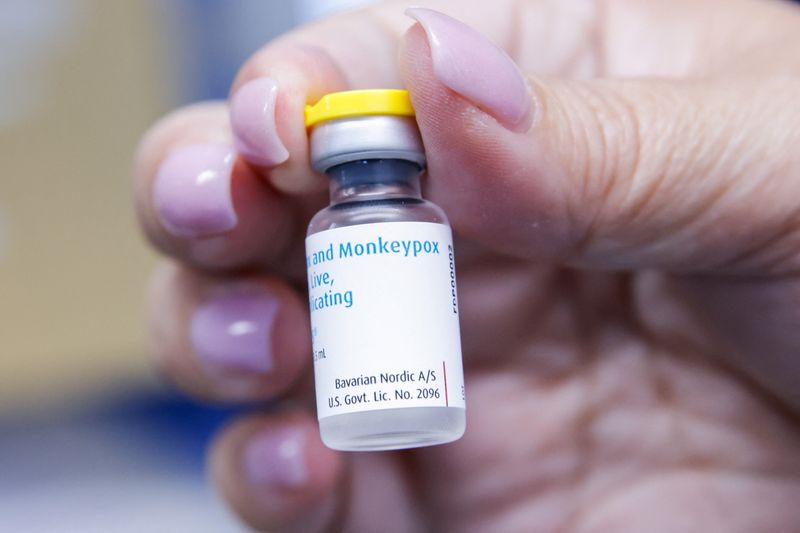Analysis-Years of neglect leaves sexual health clinics ill-prepared for monkeypox
2022.07.19 00:17
4/4

FILE PHOTO: A nurse holds a monkeypox vaccination at the Northwell Health Immediate Care Center at Fire Island-Cherry Grove, in New York, U.S., July 15, 2022. REUTERS/Eduardo Munoz
2/4
By Julie Steenhuysen and Jennifer Rigby
CHICAGO/LONDON (Reuters) – Sexual health clinics on the frontline of the monkeypox response are already financially stretched, leaving the United States and UK ill-equipped to tackle the first major global health test since the COVID-19 pandemic.
Infectious disease experts say sexual health clinics – which offer confidential walk-in diagnosis and treatment – are best placed to identify and treat cases of monkeypox, which is largely affecting men who have sex with men.
Yet such programs are doing so largely without additional funding despite years of financial neglect. There is little data on funding for sexual health services globally, but experts agree that the sector is under-resourced.
That has impeded the monkeypox response and diverted scarce resources needed to curb rising rates of other sexually transmitted diseases (STD), sexual health experts in the UK and the United States told Reuters.
This lack of resources could result in further spread of monkeypox, they said. According to the World Health Organization (WHO), the outbreak has reached 63 countries.
“This is a gap and a weakness in our public health system that monkeypox has exposed,” Dr. Meg Doherty, director of the WHO’s Global HIV, Hepatitis and STIs Programmes, said in an email.
“Even among high income countries, funding for sexual health globally is decreasing or remains unfunded,” she said.
Although monkeypox is being transmitted through sexual contact, the virus can infect anyone who comes in contact with pus-filled sores, body fluids, respiratory droplets or contaminated linens.
Clinic staff must take extra time cleaning exam rooms and buy additional protective gear. When added to chronic low staffing, a problem exacerbated by the COVID pandemic, appointments can be hard to come by. Testing equipment in the United States is also in short supply.
Monkeypox has been endemic in parts of Africa for years, but since early May, the virus has been spreading rapidly in other countries mainly among gay and bisexual men, who often present with rashes in the genital and anal area that doctors may confuse with herpes or syphilis. Out of 11,500 confirmed cases globally, 1,469 are in the United States and 1,856 are in the UK, according to a Reuters tally.
In Spain, with 2,447 cases – the most in the world – patients are being seen in hospitals and health clinics. Local health authorities said they added extra testing capacity early in the outbreak and the health system was not under pressure.
FUNDING CUTS
Data from a UK charity called the Health Foundation show England’s sexual health services’ budget was cut by 14% over a six-year period ending in fiscal 2022. UK clinics have yet to receive any new funding to meet the additional monkeypox demand.
In the United States, funding for sexual healthcare and research likewise has dwindled, said David Harvey, executive director of the National Coalition of STD Directors (NCSD).
“Monkeypox has shone a glaring light on this fact. Broadly speaking, the STD field has been vastly underfunded for 20 to 30 years,” said Harvey, whose group has requested $100 million in funding to address the monkeypox outbreak.
Federal funding for STD programs has remained relatively flat in the past two decades – $168.5 million in 2003 vs $152.5 million in 2022 – a 40% drop when accounting for inflation, according to the NCSD. State and local investments also have fallen, even as STD rates reached all-time highs, according to a 2021 National Academies of Sciences, Engineering and Medicine report.
A survey of NCSD’s membership released on June 12 found that 42.7% of U.S.-based sexual health clinics have access to appropriate testing swabs, and less than 20% have appropriate tubes for collecting monkeypox specimens for transport to clinical labs.
With limited providers and appointment slots, clinics must triage patients, prioritizing those with pain or rash or suspected monkeypox. That has left asymptomatic patients and those in need of other services without care.
Harun Tulunay, 35, a sexual health advocate who is HIV positive and was recently hospitalized with monkeypox in London, knows of friends whose sexual health appointments were delayed or unobtainable “because they (clinics) are too busy dealing with monkeypox.”
He is not surprised, as he experienced the time-consuming decontamination efforts when he was diagnosed.
“We see it overwhelming clinics,” he said. “If we suddenly have 5,000 cases, what will happen?”
Last week, a coalition of sexual health/HIV organizations in the UK called for urgent funding support, seeking £51 million ($60 million) for sexual health services to “contain and eliminate monkeypox” as some clinics reported drastic drops in essential services.
Part of the issue is that funding for HIV and other sexually transmitted infections is largely separate, especially in the United States.
“There’s been a lot of money put into HIV, which is appropriate, however, STI has been a pauper,” said Dr. Matt Golden, director of the HIV/STD clinic serving Seattle and Washington state’s King County. His clinic has diagnosed half of the area’s monkeypox cases as well as provided vaccines and treatment guidance.
Experts in both countries agreed that monkeypox was a wake-up call for more investment in sexual health. “It is time we do something,” said NCSD’s Harvey.








